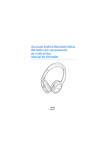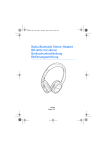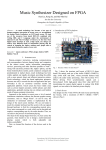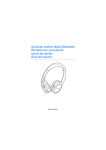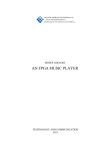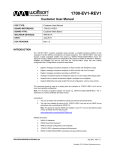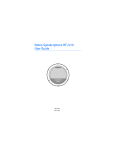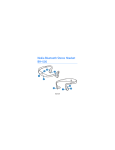Download Nokia BH-905i
Transcript
Nokia Bluetooth Stereo Headset BH-905 with active noise cancellation User Guide 9216260 Issue 1 EN DECLARATION OF CONFORMITY Hereby, NOKIA CORPORATION declares that this BH-905 product is in compliance with the essential requirements and other relevant provisions of Directive 1999/5/EC. A copy of the Declaration of Conformity can be found at http://www.nokia.com/phones/ declaration_of_conformity/. © 2009 Nokia. All rights reserved. Nokia, Nokia Connecting People and the Nokia Original Accessories logo are registered trademarks of Nokia Corporation. Nokia tune is a sound mark of Nokia Corporation. Other product and company names mentioned herein may be trademarks or tradenames of their respective owners. Reproduction, transfer, distribution, or storage of part or all of the contents in this document in any form without the prior written permission of Nokia is prohibited. Bluetooth is a registered trademark of Bluetooth SIG, Inc. Nokia operates a policy of ongoing development. Nokia reserves the right to make changes and improvements to any of the products described in this document without prior notice. TO THE MAXIMUM EXTENT PERMITTED BY APPLICABLE LAW, UNDER NO CIRCUMSTANCES SHALL NOKIA OR ANY OF ITS LICENSORS BE RESPONSIBLE FOR ANY LOSS OF DATA OR INCOME OR ANY SPECIAL, INCIDENTAL, CONSEQUENTIAL OR INDIRECT DAMAGES HOWSOEVER CAUSED. THE CONTENTS OF THIS DOCUMENT ARE PROVIDED "AS IS". EXCEPT AS REQUIRED BY APPLICABLE LAW, NO WARRANTIES OF ANY KIND, EITHER EXPRESS OR IMPLIED, INCLUDING, BUT NOT LIMITED TO, THE IMPLIED WARRANTIES OF MERCHANTABILITY AND FITNESS FOR A PARTICULAR PURPOSE, ARE MADE IN RELATION TO THE ACCURACY, RELIABILITY OR CONTENTS OF THIS DOCUMENT. NOKIA RESERVES THE RIGHT TO REVISE THIS DOCUMENT OR WITHDRAW IT AT ANY TIME WITHOUT PRIOR NOTICE. The availability of particular products may vary by region. Please check with your Nokia dealer for details. Export controls This device may contain commodities, technology or software subject to export laws and regulations from the US and other countries. Diversion contrary to law is prohibited. 9216260/Issue 1 EN Contents 1. Introduction ......................... 4 Bluetooth wireless technology .......... 4 About active noise cancellation........ 5 2. Get started............................ 6 Keys and parts ........................................ Connection method .............................. Connect using Bluetooth connectivity ......................................... Connect using the audio cable ...... Charge the battery ................................ Operating time when using Bluetooth connectivity..................... Operating time when using the audio cable................................... Activate or deactivate Bluetooth connectivity ........................ Activate................................................. Deactivate ............................................ 6 6 6 7 7 8 8 8 9 9 Pair and connect the headset to a Bluetooth device........................... 9 Disconnect the headset.................. 10 Reconnect the headset................... 11 Troubleshooting ................................... 11 3. Basic use ............................. 12 Place the headset over the head..... Active noise cancellation .................. Adjust the volume ............................... Calls......................................................... Listen to music..................................... Clear settings or reset........................ 12 12 12 13 13 14 4. Battery and charger information............................. 15 Care and maintenance ........... 16 3 Introduction 1. Introduction The Nokia Bluetooth Stereo Headset BH-905 with active noise cancellation allows you to handle calls hands-free with a compatible mobile device and listen to music from a compatible music player. Active noise cancellation helps you to use the headset also in noisy environments. You can connect the headset to a compatible device using Bluetooth wireless technology or the CA-143U audio cable. Read this user guide carefully before using the headset. Also, read the user guide for the device that you connect to the headset. For more information, see www.nokia.com/support or your local Nokia website. This product may contain small parts. Keep them out of the reach of small children. The surface of this device does not contain nickel in the platings. The surface of this device contains stainless steel. ■ Bluetooth wireless technology Bluetooth wireless technology allows you to connect compatible devices without cables. The headset and the <10m other device do not need to be in line of sight, but they should be within 10 metres (33 feet) of each other. The closer the headset and the other device are to each other, the better the performance. The optimal operating range is shown in dark grey in the picture. The connection is subject to interference from distance and obstructions (shown in light grey) or other electronic devices. The headset is compliant with the Bluetooth Specification 2.1 + EDR supporting the following profiles: Headset Profile 1.1, Hands-Free Profile (HFP) 1.5, Advanced Audio Distribution Profile (A2DP) 1.2, and 4 Introduction Audio Video Remote Control Profile 1.0. Check with the manufacturers of other devices to determine their compatibility with this device. ■ About active noise cancellation Wolfson AudioPlusTM Ambient Noise Cancellation technology uses patented signal processing technology and advanced acoustic design expertise to deliver class-leading active noise cancellation for stereo headsets and headphones. This novel feed-forward technology cancels more decibels of noise across a wider frequency range than traditional feedback technologies, providing a peaceful and tranquil environment for users wherever they happen to be. As Wolfson's advanced technology does not process the playback audio stream, your music comes through in untouched hi-fi quality stereo. 5 Get started 2. Get started ■ Keys and parts The headset contains the following parts: 1. Power key for active noise cancellation 2. Indicator light for charging and active noise cancellation 3. Charger connector 4. Volume keys 10 9 5. Rewind key 6. Connector for Nokia CA-143U audio cable 7. Bluetooth indicator light 8. Play/Pause key 9. Forward key 10. Multifunction key Parts of the device are magnetic. Metallic materials may be attracted to the device. Do not place credit cards or other magnetic storage media near the device, because information stored on them may be erased. ■ Connection method You can connect the headset to compatible devices using Bluetooth wireless technology or the CA-143U audio cable. Before you can connect the headset to a Bluetooth device or use active noise cancellation, you must charge the battery. See “Charge the battery”, p. 7. Connect using Bluetooth connectivity To use the headset with a compatible Bluetooth device, activate Bluetooth connectivity (see “Activate”, p. 9) and pair and connect the 6 Get started headset to the device (see “Pair and connect the headset to a Bluetooth device”, p. 9). If you plug the CA-143U audio cable into the headset when the headset is connected to a Bluetooth device, the device is disconnected and Bluetooth connectivity is deactivated. Connect using the audio cable The headset is supplied with the Nokia CA-143U audio cable. The headset may also be supplied with adapters to connect the cable to different devices. To extend the length of the audio cable, use the CA144U extension cable. To connect the headset to a device that has the Nokia 3.5 mm AV connector, plug the audio cable into the headset and the AV connector. To connect the headset to a device that has a standard 3.5 mm audio connector, plug the audio cable into the headset and the AD-63 adapter, and insert the adapter into the audio connector. To connect the headset to a device that has the Nokia 2.5 mm AV connector, plug the audio cable into the headset and the AD-52 adapter, and insert the adapter into the AV connector. To connect the headset to a home stereo system that has a standard 6.3 mm headphone connector, plug the audio cable into the headset and the AD-70 adapter, and insert the adapter into the headphone connector. To connect the headset to an airplane audio system that has a 3.5 mm headphone connector, plug the audio cable into the headset and the AD-71 adapter, and insert the adapter into the headphone connector. ■ Charge the battery Before you can connect the headset to a Bluetooth device or use active noise cancellation, you must charge the battery. Before charging the battery, carefully read “Battery and charger information”, p. 15. 7 Get started Warning: Use only chargers approved by Nokia for use with this particular model. The use of any other types may invalidate any approval or warranty, and may be dangerous. When you disconnect the power cord of any accessory, grasp and pull the plug, not the cord. 1. Connect the charger to a wall outlet. 2. Connect the charger cable to the charger connector. The indicator light for charging and active noise cancellation is red during charging. Charging the battery fully may take up to 2 hours. 3. When the battery is fully charged, the indicator light turns green. Disconnect the charger from the headset, then from the wall outlet. When the battery charge is low and Bluetooth connectivity is activated, the headset beeps every 5 minutes and the indicator light for charging and active noise cancellation flashes red. Operating time when using Bluetooth connectivity When active noise cancellation is activated, the fully charged battery has power for up to 15 hours of talk time, up to 40 hours of standby time, or up to 16 hours of music playing time. When active noise cancellation is deactivated, the fully charged battery has power for up to 24 hours of talk time, up to 600 hours of standby time, or up to 25 hours of music playing time. Operating time when using the audio cable The fully charged battery has power for up to 40 hours of active noise cancellation. ■ Activate or deactivate Bluetooth connectivity When Bluetooth connectivity is activated, you can connect the headset to one or two compatible Bluetooth devices. 8 Get started Even if Bluetooth connectivity is deactivated, you can use the headset for handling calls and listening to music through the CA-143U audio cable. Activate To activate Bluetooth connectivity, press and hold the multifunction key for about 2 seconds. The headset beeps, and the Bluetooth indicator light briefly flashes green. The headset tries to connect to the last used mobile device that supports the HFP Bluetooth profile and the last used music player that supports the A2DP profile, if the same device does not support both profiles. When the headset is connected to the device and is ready for use, the Bluetooth indicator light flashes blue slowly. If the headset has not been previously paired with any device, it automatically enters pairing mode. See also “Pair and connect the headset to a Bluetooth device”, p. 9. Deactivate To deactivate Bluetooth connectivity, press and hold the multifunction key for about 5 seconds. The headset beeps, and the Bluetooth indicator light briefly flashes red. If the headset is not connected to a Bluetooth device within about 30 minutes, the headset deactivates Bluetooth connectivity automatically. Bluetooth connectivity is also deactivated if you connect the CA-143U audio cable to the headset. ■ Pair and connect the headset to a Bluetooth device If your mobile device supports the A2DP Bluetooth profile and has a music player feature, you can use the device to also play music through the headset. If your mobile device does not support the A2DP profile, you can separately pair the headset with the mobile device and a music player that supports this profile. If you have paired and connected the headset 9 Get started with your mobile device, disconnect the headset from it before pairing the headset with the music player. 1. Ensure that your mobile device or music player is switched on. 2. To pair the headset if it has not been previously paired with a device, activate Bluetooth connectivity on the headset. The headset enters pairing mode, and the Bluetooth indicator light starts to flash blue quickly. To pair the headset if it has been previously paired with a device, ensure that Bluetooth connectivity is deactivated on the headset, and press and hold the multifunction key (for about 5 seconds) until the blue indicator light starts to flash quickly. 3. Within about 3 minutes, activate Bluetooth connectivity on your mobile device or music player, and set it to search for Bluetooth devices. For instructions, see the user guide of your device . 4. Select the headset from the list of found devices on your mobile device or music player. 5. If necessary, enter the passcode 0000 to pair and connect the headset to your device. If your device does not have a keypad, it may use this passcode by default. In some devices, you may need to make the connection separately after pairing. You only need to pair the headset with your device once. If pairing is successful, the headset appears in the menu of your device where you can view the currently paired Bluetooth devices. When the headset is connected to your device and is ready for use, the Bluetooth indicator light flashes blue slowly. You can pair the headset with up to eight devices but connect it to only one device supporting the HFP Bluetooth profile and another device supporting the A2DP Bluetooth profile at a time. Disconnect the headset To disconnect the headset from your Bluetooth device, deactivate Bluetooth connectivity on the headset, or disconnect the headset in the 10 Get started Bluetooth menu of your device. If you disconnect the headset from a music player while listening to music, first press the play/pause key to pause playing. You do not need to delete pairing with the headset to disconnect it. Reconnect the headset To manually connect the headset to the last used device that supports the A2DP Bluetooth profile, but not the HFP profile (for example, after connection loss), deactivate and activate Bluetooth connectivity on the headset, or press the play/pause key when Bluetooth connectivity is activated. To manually connect the headset to the last used device that supports the HFP Bluetooth profile or the HFP and A2DP profiles, start the connection in the Bluetooth menu of your device, or press and hold the multifunction key for about 2 seconds. You may be able to set your device so that the headset connects to it automatically. To activate this feature in a Nokia device, change the paired device settings in the Bluetooth menu. ■ Troubleshooting If you cannot connect the headset to your compatible Bluetooth device, do the following: • Ensure that the headset is charged. • Ensure that Bluetooth connectivity is activated on the headset and the other device and the headset is paired with your device. • Ensure that the CA-143U audio cable is not connected to the headset. • Ensure that the headset is within 10 metres (33 feet) of your device and that there are no obstructions between the headset and the device, such as walls, or other electronic devices. See also “Clear settings or reset”, p. 14. 11 Basic use 3. Basic use ■ Place the headset over the head Turn the speaker pads towards each other, and place the headset over your head so that the pads rest comfortably on your ears. Place the pad indicated with L on the left ear and the pad with R on the right ear. Adjust the headband length for the best fit. Warning: When you use the headset, your ability to hear outside sounds may be affected. Do not use the headset where it can endanger your safety. When you stop using the headset, ensure that active noise cancellation is deactivated to save battery power. ■ Active noise cancellation Active noise cancellation reduces ambient noise in noisy environments. You can also use active noise cancellation for noise reduction, for example, on an airplane when Bluetooth connectivity is deactivated and the CA-143U audio cable is not connected to the headset. To activate active noise cancellation, slide the power key for active noise cancellation toward the charger connector. The indicator light for charging and active noise cancellation is displayed green. To deactivate active noise cancellation, slide the power key away from the charger connector. The indicator light for charging and active noise cancellation turns off. ■ Adjust the volume To adjust the headset volume, press the volume up or down key during a call or while listening to music. To adjust the volume quickly, press and hold either key. You can also adjust the volume on the connected device if it supports this feature with the headset. 12 Basic use ■ Calls To make a call, use your mobile device in the normal way when the headset is connected to it. To redial the number you last called (if your mobile device supports this feature with the headset), when no call is in progress, press the multifunction key twice. To activate voice dialling (if your mobile device supports this feature with the headset), when no call is in progress, press and hold the multifunction key for about 2 seconds until the mobile device starts voice dialling, and proceed as described in the user guide of your mobile device. To answer or end a call, press the multifunction key, or use the keys of the mobile device. To reject a call, press the multifunction key twice quickly. To mute or unmute the microphone during a call when using Bluetooth connectivity, press and hold the play/pause key for about 2 seconds. When the microphone is muted, the Bluetooth indicator light flashes blue twice every 5 seconds. To switch a call between the headset and your connected device when using Bluetooth connectivity, press and hold the multifunction key for about 2 seconds. To switch a call from the headset to the connected device when using the audio cable, disconnect the CA-143U cable from the headset. To switch the call back to the headset, reconnect the cable. ■ Listen to music To listen to music, connect the headset to a compatible music player using Bluetooth wireless technology or the CA-143U audio cable. If you connect the headset to a Bluetooth device, ensure that it supports the A2DP Bluetooth profile. The available music functions depend on your music player. If you receive or make a call while listening to music, the music is paused until you end the call. 13 Basic use Warning: Listen to music at a moderate level. Continuous exposure to high volume may damage your hearing. To play a song, select the song in the music player, and press the play/ pause key. To pause or resume playing, press the play/pause key when using Bluetooth connectivity, or press and hold the play/pause key when using the audio cable. To stop playing when using Bluetooth connectivity, press and hold the play/pause key for about 2 seconds. To select the next song during playback, press the forward key. To select the previous song, press the rewind key. To scroll through the current song quickly, press and hold either key. ■ Clear settings or reset To clear the volume and pairing settings from the headset, deactivate Bluetooth connectivity, and press and hold the multifunction key and the volume up key (for about 5 seconds) until the Bluetooth indicator light starts to alternate between red and green. To reset the headset if it stops functioning, even though it is charged, press the volume down key, the multifunction key, and the rewind key. The reset does not clear the settings. 14 Battery and charger information 4. Battery and charger information This device has an internal, nonremovable, rechargeable battery. Do not attempt to remove the battery from the device as you may damage the device. This device is intended for use when supplied with power from the following chargers: AC-3, AC-4, AC-5, and DC-4. The exact charger model number may vary depending on the type of plug. The plug variant is identified by one of the following: E, EB, X, AR, U, A, C, or UB. The battery can be charged and discharged hundreds of times, but it will eventually wear out. Recharge your battery only with Nokia approved chargers designated for this device. Use of an unapproved charger may present a risk of fire, explosion, leakage, or other hazard. If a battery is being used for the first time or if the battery has not been used for a prolonged period, it may be necessary to connect the charger, then disconnect and reconnect it to begin charging the battery. If the battery is completely discharged, it may take several minutes before the charging indicator light is displayed. Unplug the charger from the electrical plug and the device when not in use. Do not leave a fully charged battery connected to a charger, since overcharging may shorten its lifetime. If left unused, a fully charged battery will lose its charge over time. Always try to keep the battery between 15°C and 25°C (59°F and 77°F). Extreme temperatures reduce the capacity and lifetime of the battery. A device with a hot or cold battery may not work temporarily. Battery performance is particularly limited in temperatures well below freezing. Do not dispose of batteries in a fire as they may explode. Batteries may also explode if damaged. Never use any charger that is damaged. Important: Operating times are estimates only and depend on network conditions, features used, battery age and condition, temperatures to which battery is exposed, and many other factors. 15 Care and maintenance Care and maintenance Your device is a product of superior design and craftsmanship and should be treated with care. The following suggestions will help you protect your warranty coverage. • Keep the device dry. Precipitation, humidity, and all types of liquids or moisture can contain minerals that will corrode electronic circuits. If your device does get wet, allow it to dry completely. • Do not use or store the device in dusty, dirty areas. Its moving parts and electronic components can be damaged. • Do not store the device in hot areas. High temperatures can shorten the life of electronic devices, damage batteries, and warp or melt certain plastics. • Do not store the device in cold areas. When the device returns to its normal temperature, moisture can form inside the device and damage electronic circuit boards. • Do not attempt to open the device. • Do not drop, knock, or shake the device. Rough handling can break internal circuit boards and fine mechanics. • Do not use harsh chemicals, cleaning solvents, or strong detergents to clean the device. • Do not paint the device. Paint can clog the moving parts and prevent proper operation. These suggestions apply equally to your device, charger, or any accessory. If any device is not working properly, take it to the nearest authorised service facility for service. Recycle The crossed-out wheeled-bin symbol on your product, battery, literature, or packaging reminds you that all electrical and electronic products, batteries, and accumulators must be taken to separate collection at the end of their working life. This requirement applies in the European Union. Do not dispose of these products as unsorted municipal waste. For more environmental information, see the product Eco-Declarations at www.nokia.com/environment. Always return your used electronic products, batteries, and packaging materials to a dedicated collection point. This way you help prevent uncontrolled waste disposal and promote the recycling of materials. More detailed information is available from the product retailer, local waste authorities, national producer 16 Care and maintenance responsibility organisations, or your local Nokia representative. Check how to recycle your Nokia products at www.nokia.com/werecycle, or if browsing on a mobile device, www.nokia.mobi/werecycle. Wolfson Microelectronics plc is a leading global provider for high performance, mixed signal semiconductors to the consumer electronics market. Wolfson is renowned for its high performance audio and very low power consumption. Its devices are at the heart of many high profile consumer electronics products, including mobile phones, multimedia players, flat panel TVs and in-car infotainment systems. Wolfson technology enables exciting new enduser experiences by connecting the digital world to the human senses. For more information about Wolfson Microelectronics, see www.wolfsonmicro.com. 17




















